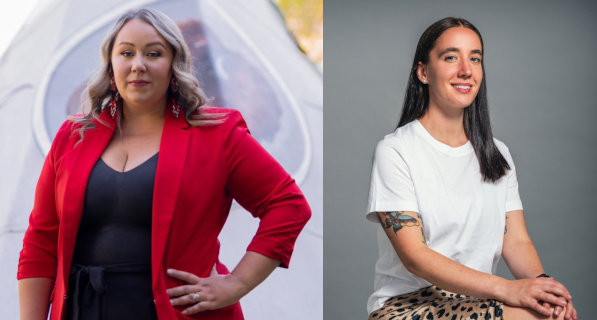U of A Law student and alumna each earn Supreme Court of Canada clerkships
Helen Metella - 14 March 2023

A graduating student and an alumna of the University of Alberta Faculty of Law have each been selected for clerkships at the Supreme Court of Canada.
Casey Caines, ’23 JD, will be clerking for the Honourable Michelle O’Bonsawin. Elisa Carbonaro, ’22 JD, will be clerking for the Honourable Russell Brown, a former Faculty member. Both clerkships run for one year and begin in August 2024.
"This is an opportunity afforded to very few law students across the country and we are enormously proud to see two students from the University of Alberta Faculty of Law on the list of clerks for 2024/25,” said Barbara Billingsley, dean of the Faculty of Law.
“I am confident that Elisa and Casey will do excellent work for the Court and will learn a great deal from this experience."
Casey Caines
“My grandmother was not able to vote in our country until the Sixties, when my father was 20 years old,” said Casey Caines, who is Cree and Dene and a member of Fort Nelson First Nations. “Now, one generation later, I have the opportunity to clerk for an Indigenous justice at the Supreme Court of Canada. It’s an almost unimaginable dream.”
Caines has made countless unimaginable dreams a reality during her journey toward a career in law.
Raised in Fort Nelson, British Columbia, she moved to northern Alberta after high school to work first in oil field services and then as the owner of a real estate business. When the eldest of her two daughters was diagnosed with autism, Caines assumed advocacy roles but soon realized she needed to be where decisions are made, and in particular, to understand how laws are made. She began law school in September 2020, when the COVID-19 pandemic suddenly made all classes virtual. Yet Caines excelled.
As a 1L studying from home while also homeschooling her eldest daughter, she attended the UN Youth Summit virtually, leading workshops and creating a to-do list for global challenges with young leaders from around the world. The same year, she was also a guest speaker at the G7 Youth Summit. She went on to be the co-chair external of the Indigenous Law Students’ Association at the U of A, and vice-president First Nations of the National Indigenous Law Students’ Association. Since 2021, she’s been a research assistant at the Wahkohtowin Law & Governance Lodge, a research unit dedicated to upholding Indigenous laws and governance that is based at the University of Alberta, and been a research assistant to several Faculty of Law professors.
Always an avid volunteer for her community, Caines co-founded the Waniska Leadership Retreat to inspire the next generation of Indigenous leaders. Prior to law school, she co-founded the Medicine Box Project, an Indigenous-created-and-led community project to deliver knowledge about and access to medicine gardens. In 2021, she was awarded the Lou Hyndman Edmonton Glenora Award for demonstrating outstanding leadership and involvement in her community and at her university.
Clerking at the Supreme Court will be “a really good experience to learn from and alongside brilliant legal minds to reason through cases of national importance,” said Caines. “My whole life has been shaped by cases like Bill C-31 (the Bill to Amend the Indian Act, which established that marriage does not affect a woman’s Indian status).”
In June 2023, Caines will start her articles with the Wahkohtowin Law and Governance Lodge and will finish them with the Alberta Court of Appeal.
Elisa Carbonaro
When she graduated from the Faculty of Law in 2022, Elisa Carbonaro was awarded the Judges’ Bronze Medal, which goes to a graduating student who stands third in academic standing throughout their studies in the JD program.
Less than a year later, her hard work and determination have earned her another prestigious reward — a clerkship at the Supreme Court of Canada with the Honourable Russell Brown.
As Carbonaro points out quickly, determination was an important factor in her latest success.
“This was my second time going through the process (of applying and interviewing),” she said. “I’m comfortable with sharing that because it’s important for other students to know that it’s often a two-year process and to not get discouraged.”
Applying a second time allowed Carbonaro to highlight what she’s learned in the interim, while clerking at the Alberta Court of Appeal for the past nine months. It also enhanced her confidence and perseverance, two skills she knows are vitally useful in criminal law, an area she’s keen to practice in and will see a lot of at the Supreme Court.
“I’m fascinated by the way criminal law reflects our changing society and values. I’m also drawn to the Constitutional overlay. You get so many Charter issues, you see this massive tension between the weight of the state and the individual. It’s always ripe for legal analysis.”
Carbonaro brings a blend of intellectual and practical problem-solving experience to her clerkship role. Since law school, she’s been reviewing arguments brought before Alberta’s appellant court and parsing out their key legal issues. During her studies, she was a member of the Alberta Law Review; a caseworker with Student Legal Services; a research assistant to several Faculty of Law professors; sat on the advisory selection committee for selecting new faculty members; and was the chair of the philanthropy committee for the U of A’s Women’s Law Forum.
Before heading to the Supreme Court clerkship, Carbonaro will complete her articles at Field Law in Edmonton.